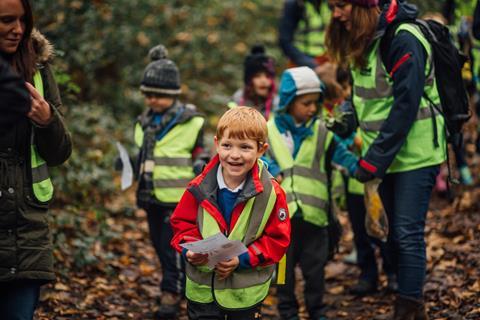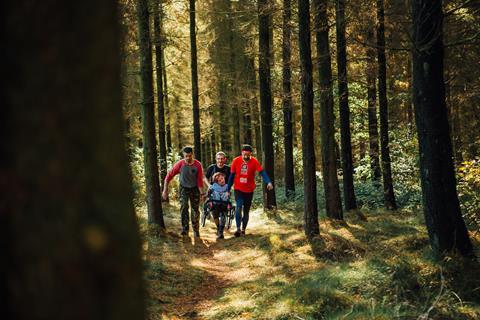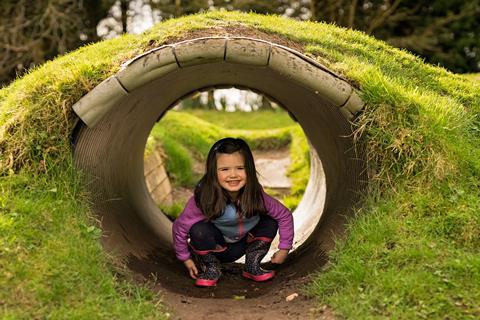Nearly 30,000 school children from disadvantaged areas are set to enjoy classes in nature this spring in an outdoor learning project spearheaded by The Wildlife Trusts.

Nature Friendly Schools, which is led by The Wildlife Trusts and supported by a consortium of outdoor learning and mental health organisations, has launched a new phase of its overall project of giving children from some of the poorest communities the opportunity to learn outside the classroom, while supporting their wellbeing, mental health and engagement with school.
The project will see Nature Friendly Schools work with more than 100 schools in areas of the highest levels of social deprivation to give almost 30,000 pupils opportunities to learn and play in nature as part of their education recovery following a year of isolation and virtual education.
Despite the pandemic, the project has already worked in 90 schools, enabling 16,000 pupils to benefit from learning in nature, training 500 teachers in outdoor learning and supporting pupils’ mental health and transforming 30 school grounds.
Craig Bennet, chief executive of The Wildlife Trusts, said: “Learning in nature boosts children’s well-being, confidence, and behaviour, and should be a fundamental part of a child’s experience in education. We’re delighted at the success of the project so far.”
“We know that children in deprived areas are much less likely to have contact with nature while the pandemic also increased screen-based learning. The new phase of Nature Friendly Schools is more important than ever for them.”
Craig Bennet, chief executive of The Wildlife Trusts.
The project was initially planned to run over four years, benefiting more than 100,000 primary and secondary pupils, but with funding not guaranteed for the final year, up to 46,000 pupils are expected to take part.
Bennet continued: “In spite of its proven success, the Nature Friendly Schools initiative is not guaranteed to see out its final year. We believe the need for this project has never been greater and it is vital it continues so we can give more children opportunities to learn, play and get creative in wild, green spaces.”

Research
According to a recent study, children from disadvantaged backgrounds are known to have been disproportionately affected by the pandemic, especially in terms of access to green space.
Research from The Wildlife Trusts and University College London shows that spending time in nature has a positive impact on children’s health and wellbeing, with its Nature Nurtures Children study revealing the educational, social and wellbeing benefits of outdoor learning.
After taking part in Wildlife-Trust-led activities:
- 79% of children surveyed felt that their experience could help their school work.
- 81% agreed that they had better relationships with their teachers.
- 84% felt that they were capable of doing new things when they tried.
- 79% reported better relationships with their classmates.

“Transformative for our pupils”
Teachers who have experienced the work of Nature Friendly Schools have reportedly seen big changes in their pupils’ attitude as well as the teacher schedule.
Stephanie Dowley, headteacher at John Randall Primary in Telford, said: “Nature Friendly Schools has been transformative for our pupils and our school. Every class now spends at least an hour learning outside each day in our forest school area, which is brilliant for the children.
“Their senses come alive, encouraging creativity and confidence. After the year children have had – much of the time being stuck at home and away from their peers – learning and playing together in nature isn’t just helpful – it’s essential.”
Kim Leathy, teacher at Westminster Academy in Blackpool, added: “Nature Friendly Schools has been so beneficial for our pupils and our school. Many children come into school with different anxieties, but when they’re learning outside, they are present in the moment, and their worries just seem to fade away.
“Being outdoors also works wonders for their creativity and enthusiasm for learning – and improves behaviour as well. Learning in nature has become a keystone part of their education.”
Schools that want to express interest in future Nature Friendly Schools projects can call 01636 670000 or email nfs@wildlifetrusts.org and the team will be able to discuss whether or not the school is eligible to take part. For more information, visit www.naturefriendlyschools.co.uk.










